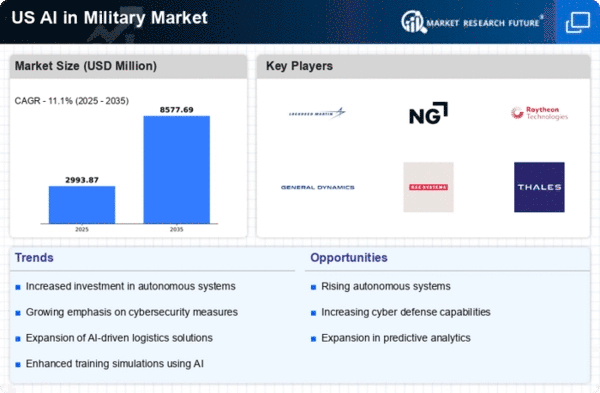Increased Defense Budgets
The AI in Military Market is experiencing a surge in funding as defense budgets in the US continue to rise. In recent years, the US government has allocated substantial resources to modernize its military capabilities, with a focus on integrating advanced technologies. For instance, the Department of Defense (DoD) has proposed a budget of over $800 billion for the fiscal year 2026, which includes significant investments in artificial intelligence. This financial commitment is likely to drive the development and deployment of AI solutions across various military applications, enhancing operational efficiency and effectiveness. As a result, the ai in-military market is poised for growth, with projections indicating a compound annual growth rate (CAGR) of approximately 15% over the next five years.
Focus on National Security
The increasing emphasis on national security is a significant driver of the AI in Military Market. In light of evolving global threats, the US government is prioritizing the development of AI technologies to enhance defense capabilities. This focus is evident in initiatives such as the National Defense Strategy, which highlights the importance of technological superiority in maintaining national security. The ai in-military market is expected to benefit from this heightened focus, as investments in AI are seen as critical for countering emerging threats. Analysts predict that the market could reach $30 billion by 2027, driven by the urgent need for advanced defense solutions.
Technological Advancements
Rapid technological advancements are a key driver in the AI in Military Market. Innovations in machine learning, data analytics, and robotics are transforming military operations, enabling more sophisticated applications of AI. The integration of AI into systems such as surveillance drones, predictive maintenance, and logistics optimization is becoming increasingly prevalent. For example, the US military has been testing AI algorithms for real-time data analysis, which can significantly enhance situational awareness on the battlefield. This trend suggests that as technology continues to evolve, the ai in-military market will expand, with an expected market value reaching $20 billion by 2030.
Growing Demand for Data-Driven Insights
The demand for data-driven insights is reshaping the AI in Military Market. Military operations generate vast amounts of data, and the ability to analyze this data effectively is crucial for informed decision-making. AI technologies are increasingly being utilized to process and interpret complex datasets, providing actionable intelligence to military leaders. This trend is particularly relevant in areas such as cyber warfare and intelligence gathering, where timely and accurate information is paramount. As the military seeks to leverage data for strategic advantages, the ai in-military market is likely to expand, with estimates suggesting a market growth of 12% annually over the next several years.
Strategic Partnerships and Collaborations
Strategic partnerships between defense contractors, technology firms, and government agencies are fostering innovation in the AI in Military Market. Collaborations are essential for developing cutting-edge AI solutions that meet the unique needs of military operations. For instance, partnerships between the DoD and private sector companies have led to the creation of AI-driven tools for intelligence analysis and mission planning. These alliances not only enhance technological capabilities but also facilitate knowledge sharing and resource pooling. As the demand for advanced AI applications grows, such collaborations are likely to become more common, further propelling the growth of the ai in-military market.

















